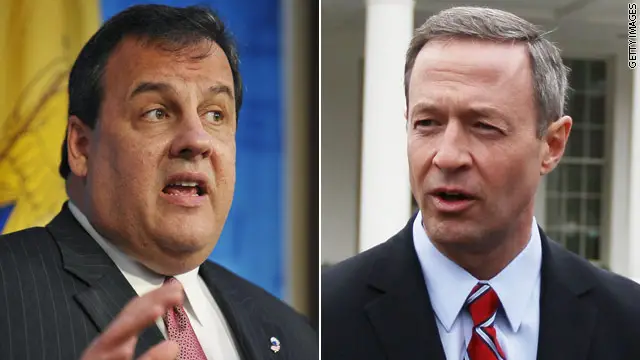Given that the Social Security Trust Fund is forecast to start operating in the red by the year 2035, most every politician knows the status quo cannot continue due to basic math. Over the years, the issue of how to “fix” Social Security gets discussed briefly, then immediately shelved when voters think that benefits are being cut, expanded, or simply touched in any way.
The can has been kicked many, many times down the road. As a result, a few of the 2016 candidates, on both sides of the aisle, have offered contrasting visions for the program.
First, former Governor Martin O’Malley (D-MD) has called for expanding the program, which is the view in line with the progressive wing of the Democratic Party. Report from the WSJ:
Former Maryland Gov. Martin O’Malley, who is considering a Democratic presidential bid, told Iowa voters that the nation must expand benefits to help more people realize the American dream.
Short on specifics, O’Malley would likely support raising the income cap and possibly increasing benefits by raising taxes on wealthy individuals to pay for it.
On the complete other end of the spectrum, Governor Chris Christie (R-NJ) has come out with a plan to reform the program by raising the retirement age and implementing means testing, among other things, as a way to make the safety net solvent once again. Report from the Washington Examiner:
By suggesting cuts to Social Security, Christie will go beyond even the boldest plans for entitlement reform offered by Rep. Paul Ryan, R-Wisc., and offer conservatives concerned about the federal debt a reason to support him.
Christie will propose raising the normal retirement age for Social Security from 67 to 69, and the early retirement age from 62 to 64.
He will also introduce significant means-testing into the program, phasing out retirement benefits starting for seniors earnings above $80,000 and zeroing them out for those earnings more than $200,000 annually.
The changes would affect future retirees rather than current beneficiaries, and Christie would not raise payroll taxes on high earners. He would also seek to address the fiscal problems with the Social Security disability program.
Christie’s plan isn’t filled with new ideas, but ideas which have been proposed over time to keep the program solvent without drastic changes.
Unfortunately, something tells me that 2016 will be filled with a lot of talk on this topic, just like previous years, but little action in the way of solving the problem. However, at least the conversation has started and candidates can offer plans and defend them which hopefully conveys the need for reform to the general public.
Also worth noting is that Hillary Clinton has tended to favor a more modest approach, somewhere in between Christie and O’Malley, as reported by the Washington Times:
Mrs. Clinton said only that as president she would be “100 percent committed” to providing retirees a good quality of life.
…
She has been under intense pressure from her Democratic Party’s left wing to embrace a plan to expand Social Security benefits and pay for it with increased taxes on wealthy Americans.
As a senator in 2007, Mrs. Clinton opposed a plan to raise the cap on income subject to Social Security tax in order to replenish the Social Security Trust Fund, which is projected to be depleted in 2035.
So far, Mrs. Clinton has avoided committing herself to any policy and offered only vague promises to fight income inequality and champion “everyday Americans.”
I’m guessing that Hillary will come out and favor something which, at minimum, will keep Social Security as it stands, perhaps by using tax increases on the top income earners to make that happen. This would fall in line with ensuring she is not outflanked on her left by O’Malley.
Donate Now to Support Election Central
- Help defend independent journalism
- Directly support this website and our efforts
